In "On Being Ill," Virginia Woolf offers a profound meditation on the intersection of illness, the body, and the self, exploring the subjective experience of sickness through a lyrical and introspective lens. Woolf's literary style is characterized by its stream-of-consciousness narrative and rich imagery, allowing readers to feel the fragmented yet intimate nature of illness. Written in the context of early 20th-century modernism, the essay delves into how societal perceptions of health and wellness shape one'Äôs identity and experience, challenging the traditional silencing of the ill and giving voice to their inner lives. Virginia Woolf, a pioneering figure of modernist literature, often faced personal struggles with mental health and physical ailments. This intimate connection to suffering fueled her desire to articulate the nuances of illness, as she sought to transform the often lonely experience of being unwell into a shared human condition. Woolf'Äôs own battles with health and her literary friendships undoubtedly influenced her examination of existential themes, allowing her to approach the subject with unique sensitivity and insight. "On Being Ill" is an essential read for those interested in the complexities of human experience, offering a nuanced exploration that resonates beyond its era. Woolf's eloquent prose invites readers to reflect on their own experiences with illness, making this work a timeless and deeply enriching journey into the heart of what it means to be human.

200 Meisterwerke der Literaturgeschichte : Die größten Klassiker der Weltliteratur
Franz Kafka, Victor Hugo, Fjodor Michailowitsch Dostojewski, Lord Byron, Giacomo Leopardi, Marcel Proust, Henrik Ibsen, Percy Bysshe Shelley, Charles Dickens, Jane Austen, Mary Shelley, Emily Brontë, Charlotte Brontë, Anne Brontë, William Makepeace Thackeray, Bram Stoker, Henry Fielding, George Eliot, William Shakespeare, D. H. Lawrence, Walt Whitman, Herman Melville, Thomas Wolfe, Virginia Woolf, Joseph Conrad, Sinclair Lewis, Lewis Carrol, Edgar Allan Poe, Edward Bulwer-Lytton, Oscar Wilde, H. G. Wells, Daniel Defoe, James Fenimore Cooper, Lew Wallace, Jonathan Swift, Robert Louis Stevenson, Mark Twain, Walter Scott, Nathaniel Hawthorne, Harriet Beecher Stowe, Laurence Sterne, Frances Hodgson Burnett, Arthur Conan Doyle, Wilkie Collins, Edgar Wallace, Jack London, Henry David Thoreau, John Galsworthy, F. Scott Fitzgerald, Rudyard Kipling, G. K. Chesterton, Washington Irvin, O. Henry, Ambrose Bierce, Alexander Sergejewitsch Puschkin, Michail Lermontow, Iwan Sergejewitsch Turgenew, Leo Tolstoi, Nikolai Gogol, Iwan Gontscharow, Nikolai Leskow, Anton Pawlowitsch Tschechow, Maxim Gorki, François Rabelais, Jean de la Fontaine, Blaise Pascal, Pierre Corneille, Moliere, Jean Baptiste Racine, Charles Perrault, Voltaire, Denis Diderot, Jean Jacques Rousseau, Pierre Ambroise Choderlos de Laclos, Antoine-François Prévost, Marquis de Sade, François René Chateaubriand, Stendhal, Honoré de Balzac, Alexandre Dumas, Alphonse de Lamartine, George Sand, Gustave Flaubert, Emile Zola, Guy de Maupassant, Alphonse Daudet, Jules Verne, Joris-Karl Huysmans, Prosper Mérimée, Charles Baudelaire, Stéphane Mallarmé, Arthur Rimbaud, André Gide, Arthur Schopenhauer, Heinrich Heine, Friedrich Schiller, Johann Wolfgang von Goethe, Jacob Grimm, Gottfried von Straßburg, Wolfram von Eschenbach, E. T. A. Hoffmann, Annette von Droste-Hülshoff, Heinrich von Kleist, Friedrich Hölderlin, Theodor Fontane, Gustav Freytag, Gottfried Keller, Theodor Storm, Stefan Zweig, Joseph von Eichendorff, Klaus Mann, Rainer Maria Rilke, Johanna Spyri, Joseph Roth, Karl May, Robert Musil, Heinrich Mann, Sigmund Freud, Friedrich Nietzsche, Dante Alighieri, Giovanni Boccaccio, Giacomo Casanova, Luigi Pirandello, Giosuè Carducci, Gabriele D'Annunzio, Niccolo Machiavelli, Miguel Cervantes de Saavedra, Pedro Calderón de la Barca, Vicente Blasco Ibañez, Knut Hamsun, Homer, Äsop, Herodot, Thukydides, Xenophon, Platon, Aristoteles, Sophokles, Euripides, Aristophanes, Laotse, Konfuzius, Siddhartha Gautama Buddha, Titus Livius, Tacitus, Marcus Tullius Cicero, Vergil, Ovid, Lukian, Petronius, Apuleius, Longos von Lesbos, Mark Aurel, Aurelius Augustinus
book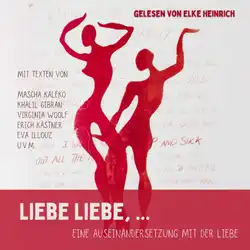
Liebe Liebe, ... : Eine Auseinandersetzung mit der Liebe
Khalil Gibran, Erich Kästner, Eva Illouz, Virginia Woolf, Adele Schopenhauer, Clara Wieck, Else Lasker-Schüler, Erich Fromm, Franz Grillparzer, Franz Kafka, Friedrich Nietzsche, Friedrich Schiller, G.W.F. Hegel, Gabriele Reuter, Helene Stöcker, Hermann Jaitner, James Krüss, Kathinka Zitz, Mascha Kaléko, Nikolai Gogol, Novalis, Paula Becker, Platon, Rainer Maria Rilke, Ricarda Huch, Sigmund Freud, Ute Richter, Elke Heinrich, Martin Luther, G. Science
audiobook
Ein Zimmer für sich allein
Virginia Woolf
audiobookbook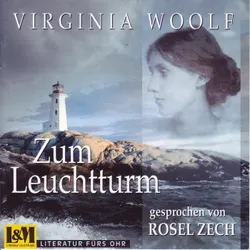
Zum Leuchtturm - Virginia Woolf (ungekürzt)
Virginia Woolf
audiobook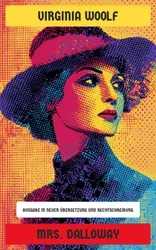
Mrs Dalloway : Ausgabe in neuer Übersetzung und Rechtschreibung
Virginia Woolf
book
Orlando : A Biography
Virginia Woolf
audiobookbook
Geschichte der Frauenbewegung: Wichtigste Werke : Frauenbewegung in Deutschland, Lelia, Die sexuelle Krise, Gegen den Mädchenhandel, Memoiren der Friedensaktivistin, Jane Eyre
Louise Otto, Clara Zetkin, Rosa Luxemburg, Rosa Mayreder, Bertha Pappenheim, Grete Meisel-Heß, George Eliot, Luise Ahlborn, Adalbert Stifter, Jane Austen, Wilhelmine von Hillern, Charlotte Brontë, Nathaniel Hawthorne, Daniel Defoe, Victor Hugo, Anne Brontë, Henrik Ibsen, Hedwig Dohm, Sinclair Lewis, Virginia Woolf, George Sand
book
Mrs. Dalloway
Virginia Woolf
audiobookbook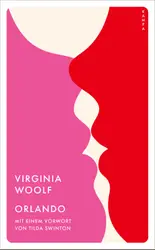
Orlando
Virginia Woolf
book
To the Lighthouse
Virginia Woolf
audiobookbook
Orlando: A Biography
Virginia Woolf
book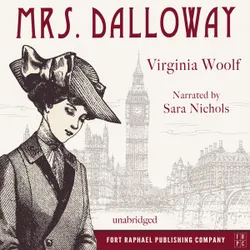
Mrs. Dalloway - Unabridged
Virginia Woolf
audiobook
